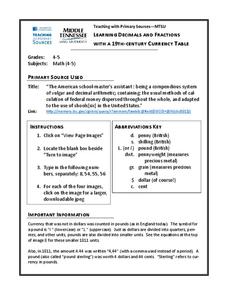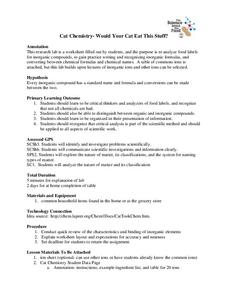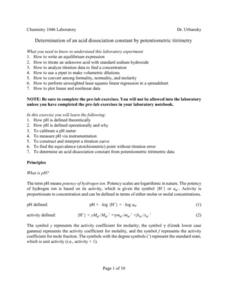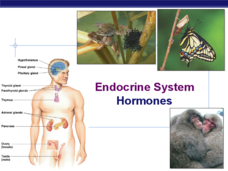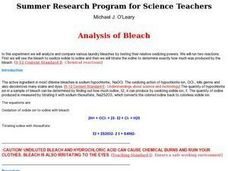Virginia Department of Education
Equilibrium and Le Chatelier’s Principle
The best part of learning about equilibrium is that nothing changes. Young chemists observe four demonstrations during this lesson: equilibrium in a saturated solution, equilibrium with an acid-base indicator, equilibrium with cobalt...
National Institute of Open Schooling
Electrochemistry
In an electrolytic cell, electrical energy is converted into chemical energy, the exact opposite of a battery! Lesson 15 in a series of 36 explores electrochemistry. Participants begin by reading and discussing oxidation/reduction...
Royal Society of Chemistry
Born-Haber Cycle: NaCl
Max Born and Fritz Haber developed the Born-Haber cycle in 1916, which is used for measuring enthalpy that otherwise couldn't be measured. Young scientists solve four matching puzzles using their knowledge of the stages, standard...
Curated OER
Acid and Base Problems
In this acid and base activity, students use seven steps to calculate concentrations of ions in acidic and basic solutions. They also determine the type of acid or base.
Curated OER
Mass and Moles Worksheet
In this mass and moles worksheet, students solve fifteen problems which include converting between moles, mass, atoms, molecules and formula units.
Teach Engineering
Exploring Energy: Kinetic and Potential
The potential of the energy in the class is moving. The third segment in a six-part unit on energy provides a deeper understanding of kinetic and potential energy. Learners understand the relationship between mass, speed, and energy and...
Curated OER
Food Additives
In this food additives activity, students will read information about the use of curing salt and ion nitrates to preserve food and the health problems that can occur from using these substances. Students will then answer 4 short answer...
Curated OER
Sea Activities
Students explore the sea. In this biology lesson plan, student investigate sea creatures, and sea water. Students discover how to convert sea water into fresh drinking water as well.
Curated OER
Decimals and Fractions
Young scholars learn about using decimals and fractions by referring to a 19th century currency table. In this decimals and fractions lesson plan, students discuss converting pounds to coins and how they relate to fractions and decimals.
Curated OER
Get the Point!
First graders, after reading about cattle drives, measure the width of the horns on drawings of longhorn cattle and then convert the measurements from inches to centimeters and from inches to feet. Ranching and the American cattle...
University of Georgia
Would Your Cat Eat This Stuff?
Processed foods use inorganic compounds for flavoring and preservation. This take-home laboratory challenges scholars to find 20 different compounds identified on the labels of foods to list on their data collection sheet. The activity...
Curated OER
Determination of An Acid Dissociation
In this chemistry worksheet, students examine the given concept in order to apply in the laboratory setting. The sheet includes in depth background information.
Curated OER
An Experiment in Alchemy: Copper to Silver to Gold
How exciting would it be for your chemistry class to produce their own "gold"? This experiment allows pupils to witness the chemical reaction of copper pennies as they react with zinc and sodium hydroxide to produce "gold" tokens. It is...
Chymist
An Experiment in Alchemy: Copper to Silver to Gold
Use chemistry to change pennies into gold coins! The experimental procedure leads learners through the process of changing copper pennies to silver and then to gold. They record the mass of each coin through every step of the experiment.
Curated OER
Determination of the solubility product of silver(I) chloride
In this chemistry worksheet, students examine the concept of solubility of silver chloride. The sheet has in depth concept and laboratory instructions.
Curated OER
Photosynthesis
If you need summary notes for independent study, or a Powerpoint to review as a class, then these slides will fit your need. There are really great, quite detailed, diagrams and some slides to summarize the 2 stages of reactions in...
Curated OER
Endocrine System - Hormones
Use this attractive PowerPoint to introduce all the hormones and their functions to your students. As students view each slide, they should be able to see the relevance of many of the chemicals and their interaction with the human body....
Curated OER
Endocrine System: Hormones
The many images and labeled diagrams in this PowerPoint will help learners understand different areas of the endocrine system. The slide
show starts with information about the absorption of lipid and protein based hormones, and then...
Santa Monica College
Single and Double Displacement Reactions
If you aren't part of the solution, you are part of the precipitate! Young chemists learn about single and double displacement reactions including precipitation reactions, neutralization reactions, and gas forming reactions. They perform...
Creative Chemistry
Maths for AS Chemistry
No practice problems are given on this handout; it is a detailed list of concepts to know and tips for working related problems in chemistry. Give this to learners as a study guide, or use it early in your career as a chemistry...
Sunlight Cal-Tech
Chromatography of Plant Pigments
Through a hands-on activity, an acetone-spinach solution is pre-made and learners use this solution to separate the pigments found in spinach using chromatography. The comprehensive resource includes an analysis and conclusion...
Cornell University
Constructing and Visualizing Topographic Profiles
Militaries throughout history have used topography information to plan strategies, yet many pupils today don't understand it. Scholars use Legos and a contour gauge to understand how to construct and visualize topographic profiles. This...
Curated OER
Moles
In this moles worksheet, students review solubility, moles of solute, molar mass, and colligative properties. This worksheet has 10multiple choice questions and 11 problems to solve.
Curated OER
Analysis of Bleach
Students analyze and compare laundry bleaches by testing their oxidizing powers. They conduct their lab experiment, compare/contrast their results with other students' work, and complete a worksheet.








